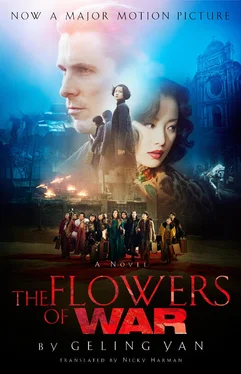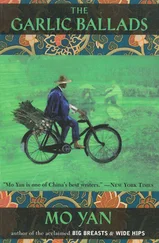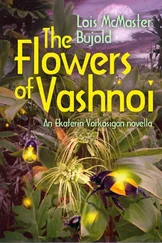At that moment, a young prostitute made for the door of the building that housed the workshop. She had seen the girls’ heads at the attic windows and felt sure that it would be a good place to go. At least it would be warmer and more comfortable than outside. Fabio grabbed her from behind but she slipped out of his grasp like an eel. Fabio made another attempt, and this time got hold of the bundle she carried on her back. It was of coarse cloth, less slippery than her satin dressing gown, and he managed to get a purchase and pull her away from the doorway. But the bundle came undone and a sudden hailstorm of small bone mah-jong pieces rained down on the ground. They were fine-quality pieces—you could tell that from the clear, clinking noise they made as they fell.
The stout, dark-skinned woman shouted: ‘If you lose one piece, Cardamom, I’ll skin your arse alive!’
‘There’s nothing wrong with my arse, Jade!’ Cardamom shouted back. ‘I bet he’d like a bit of it too!’
The schoolgirls exchanged amazed glances. Fancy a woman as dark-skinned as that having a name like Jade! As for the girl called Cardamom, she seemed barely older than they were.
Fabio had let go of Cardamom but her words, together with the threat that she might be around to say more things like this, goaded him into grabbing her again and pushing her towards the exit.
‘Out! Get out! Ah Gu! Open the door for her!’ His winter-pale face shone, as if he might break out in a sweat at any moment.
‘Ai-ya! Master, you’re my fellow countryman!’ cried Cardamom. She stumbled and her voice became shrill. ‘I beg you, please don’t! I won’t do it again!’
She had the face of a child, but her body was well developed and she simply bounced back every time he pushed her. ‘Please, master! Teach me good manners, I promise I’ll be good. I’m only fifteen years old! Sister Yumo! Put in a good word for me!’
The woman with the beautiful back put her bags and valuables in a neat pile and walked over to Fabio and Cardamom who were still struggling. Suddenly Shujuan could see her face. She realised the woman had not a slack bone in her entire body. Every part of her could smile or complain, and was capable of a subtle sign language.
‘How many times have I told you to wash your mouth out, Cardamom?’ Yumo said with a smile. She placed herself between the two of them, and pushed Cardamom back towards Jade.
Meanwhile, Ah Gu was cheerfully leading the women down into the cellar under the kitchen. The prostitutes, wide-eyed with curiosity, commented on everything as they pranced along behind him.
Pressed up against the attic window Shujuan watched the women go, her hands massaging her belly to ease the pain.
Two


During prayers that morning, there was the sound of gunfire as if fighting had broken out again somewhere in the city, the salvos coming fast and furious. It lasted for about half an hour. Despite this, Fabio insisted on going to the Safety Zone to find out whether it might still be possible to take the ferry. He came back at midday bringing only bad news. The girls listened wide-eyed as he told Father Engelmann how the streets were lined with corpses, mostly civilians and including children and old people. According to the members of the International Commission in the Safety Zone, the Japanese were shooting anyone who did not understand commands bawled in Japanese, or who ran when they saw guns. They were using the bodies to fill in the holes gouged in the road surface by explosives. When Fabio had finished speaking, he forced a smile at the girls and then glanced back at Father Engelmann. The implication was that the Father had misjudged things. When there was carnage on this scale, how could order be restored within just a couple of days?
This was at lunch. The sixteen girls sat squeezed down both sides of the refectory table normally used by the clergymen. Since their arrival at the church, Father Engelmann had ordered George to serve him his twice-daily meals of porridge or noodle soup in his room. He was a firm believer that dignity was preserved by maintaining one’s distance. He therefore put at least the patch of grass between himself and the schoolgirls. But as soon as he heard that Fabio was back from the Safety Zone, he had put down his bowl of porridge and hurried over.
‘So food and water are critical, now that we’ve just taken in another fourteen women,’ Fabio finished.
‘How much food have we got left, George?’ Father Engelmann asked.
‘Two buckets of flour, fifty kilos or so,’ said George, ‘but only a peck of rice. There’s no water but what’s in the cistern … oh, and two barrels of wine.’
Fabio shot George a look. ‘We can’t possibly use wine to wash our faces or our clothes! You can’t make tea with wine or cook food with it. Don’t talk such rubbish!’
George did not like being patronised. When the water gets low, you can drink wine instead, Deacon Adornato, since you drink it like water anyway! he thought to himself.
‘It’s better than I imagined,’ was Father Englemann’s unexpected reaction.
‘Fifty kilos of flour for so many people? We’ll be living on air in a couple of days!’ Fabio snapped at George. The cook was the only person he could vent his feelings on since he obviously had to speak civilly to Father Engelmann. George Chen, a twenty-year-old orphan with no family to protect him, was the frequent butt of other people’s bad temper. George was a beggar Father Engelmann had rescued from the streets as a child and sent to cookery school. After a few months, he had come back to the church as a cook, and had changed his name to the English ‘George’.
George ignored him and addressed Father Engelmann. ‘There’s a bit of rancid butter as well. You told me to throw it away, Father, but I hung on to it. And there’s a jar of pickled vegetables. It’s gone a bit mouldy and it doesn’t smell so good, but it’s fine to eat!’ he announced triumphantly.
Father Engelmann seemed cheered by George’s words. ‘In a couple of days, things are bound to have settled down, believe me,’ he said. ‘I’ve been to Japan many times and they’re the most courteous and friendly people in the world. The Japanese never permit a leaf out of place in a garden.’
The girls missed much of the substance of what Father Engelmann said, which they often did even though they had had English classes since they were small. But they were carried away by his infectious optimism and the exact words did not seem to matter.
Just after the priest had left, there was the sound of a commotion in the kitchen.
‘What on earth…?’ exclaimed George and rushed off to investigate.
A moment later, a woman’s voice asked: ‘Has all the food gone?’
‘There are still a few biscuits left,’ Shujuan heard George say.
Instantly, the girls were on their feet and running in the direction of the voices. Shujuan got there first. George had betrayed them; he was selling off their meagre food supplies. They needed the biscuits to eat with their soup, which was so watery these days that on its own it did nothing to allay their hunger.
Three or four of the prostitutes were already tucking into the biscuits. Shujuan recognised their ringleader as Hongling, a curvaceous young woman whose volatile temper was easily aroused. When that happened, her slender eyebrows drew together to form two straight lines, indicating that it would be dangerous to cross her.
‘George, how could you give away our biscuits to those women?’ protested Shujuan, pronouncing the words ‘those women’ as if they were a term of abuse.
Читать дальше














